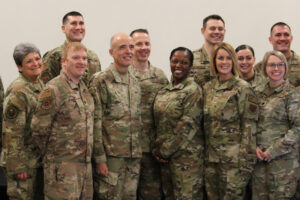
Story by Maristela Romero
Air Force Medical Service
On March 5, U.S. Air Force Surgeon General, Lt. Gen. Robert Miller and Chief Master Sgt. Dawn M. Kolczynski, Chief, Medical Enlisted Force, joined the 2024 Air Force Mental Health Flight Leadership conference to discuss enhancing military capabilities amid the evolving global landscape of potential adversaries.
The conference, which was held in Orlando, Florida, brought together Air Force mental health leaders to discuss the implications of mental health within the scope of readiness.
Miller and Kolczynski described the Air Force Medical Service’s efforts to increase the emphasis on the medical readiness structure by establishing the Air Force Medical Agency, or AFMED, which reached it its initial operating capacity in November 2023. It seeks to optimize force readiness while meeting the Defense Health Agency’s health care delivery needs. They explained how AFMED will enable mental health providers to deliver the best quality care through multidisciplinary resources, including mental health. The two senior leaders also underscored the pivotal role shared between wing commanders and medical leaders in increasing access to critical mental health and resiliency resources.
“As medics, that’s going to be incumbent on us to educate the [installation] leadership, understand where they’re coming from and give our recommendations based on risks,” said Miller. “There could be a fight tonight that our deployment teams need to be ready to support and defend the base. That’s why AFMED is critical to make sure that we can do better.”
Ultimately, improving the approach to delivering mental health care will enhance warfighting performance and better support medical needs of Airmen and Guardians before, during and after missions. Miller further noted that senior leadership are engaged in supporting the role of AFMED to optimize military health performance.
“We’ve got to capture good data and show them what their money is getting them, and what success looks like,” Miller said. “[Installation] commanders will come back and say, ‘I need more of that at my base.’”
With medics at the forefront of providing health care needs to Airmen and Guardians, Kolczynski emphasized the importance of bringing mental health services to every base and ensuring adequate training of mental health providers.
“Make sure that you can take care of yourself, so you can take care of others,” Kolczynski said.
Later during a presentation on readiness for great power competition and large-scale combat operations, Col. Matthew Hanson, deputy commander of AFMED, and Chief Master Sgt. Charles Wortman, AFMED chief of Medical Enlisted Forces, reiterated the significance of optimized performance that can be achieved by prioritizing training to protect and generate multi-capable medics.
“We are not the lone superpower in the world, so we have to change our priorities,” Hanson said. “As the Air Force continues its efforts to reoptimize as a means of generating readiness, it’s important for AFMED leaders to consider the complexity of large-scale operations and its impact on medical support. During large-scale operations, there is the potential challenge of strained medical resources, which could have a profound effect on mental health – an issue that will also need to be evaluated.”
“We must train toward combat effectiveness and application of agility to understand strategic environments as well as our adversaries do,” added Wortman. “The intent is for us to be ready, now.”
During the conference, mental health leaders also introduced the Mental Health Overview as a tool to destigmatize seeking mental help and to explain the range of available resources for service members. The overview outlines how mental health can impact the ability to engage in duties and gives recommendations on how to navigate mental resiliency while utilizing a variety of mental health resources.